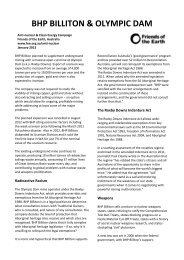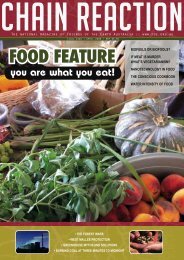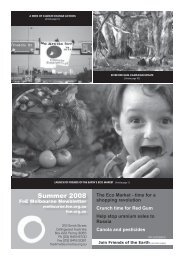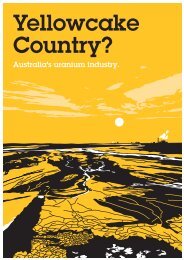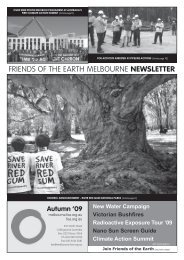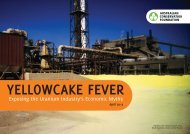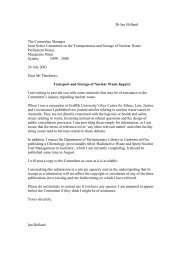Thirty Years of Creative Resistance - Friends of the Earth Australia
Thirty Years of Creative Resistance - Friends of the Earth Australia
Thirty Years of Creative Resistance - Friends of the Earth Australia
Create successful ePaper yourself
Turn your PDF publications into a flip-book with our unique Google optimized e-Paper software.
<strong>Friends</strong> <strong>of</strong> <strong>the</strong> <strong>Earth</strong> in Sydney (FoES)<br />
began on Sydney University campus in<br />
1974.<br />
More than any <strong>of</strong> <strong>the</strong> long-established FoE<br />
groups, FoES always worked on nature<br />
conservation and biodiversity issues as<br />
well as more ‘traditional’ FoE issues such<br />
as uranium, hazardous waste, waste<br />
minimisation and recycling.<br />
Throughout <strong>the</strong> 1980s and ‘90s, FoES<br />
campaigned in defence <strong>of</strong> native forests,<br />
especially in <strong>the</strong> south east <strong>of</strong> <strong>the</strong> state.<br />
In <strong>the</strong> late 1980s, with <strong>the</strong> release <strong>of</strong><br />
genetically modified organisms (GMOs) to<br />
<strong>the</strong> environment at <strong>the</strong> Waite Institute in<br />
South <strong>Australia</strong>, FoES initiated a campaign<br />
on <strong>the</strong> implications <strong>of</strong> GMOs.<br />
A number <strong>of</strong> campaigners from FoES were<br />
highly significant in <strong>the</strong> national waste<br />
minimisation and recycling campaigns.<br />
Apart from advocating for waste<br />
minimisation legislation, David Vincent<br />
highlighted <strong>the</strong> PR tactics <strong>of</strong> <strong>the</strong> packaging<br />
industry in <strong>Australia</strong> and <strong>the</strong> role <strong>of</strong><br />
industry associations in keeping Container<br />
Deposit Legislation (CDL), levies and o<strong>the</strong>r<br />
forms <strong>of</strong> regulation at bay.<br />
Unfortunately, CDL was defeated in NSW<br />
because <strong>of</strong> <strong>the</strong> influence <strong>of</strong> industry. FoES<br />
worked within <strong>the</strong> Waste Crisis Network, a<br />
coalition <strong>of</strong> environmental groups, to lobby<br />
<strong>the</strong> Government to decrease <strong>the</strong> amount<br />
<strong>of</strong> garbage being produced across <strong>the</strong><br />
state and played a key role in <strong>the</strong> creation<br />
<strong>of</strong> state-based legislation on waste<br />
minimisation.<br />
It developed a comprehensive waste<br />
minimisation strategy that proposed a<br />
cradle to grave approach to products that<br />
would make industry responsible for <strong>the</strong><br />
whole life cycle <strong>of</strong> <strong>the</strong> products it made.<br />
Through <strong>the</strong> efforts <strong>of</strong> Dietrich Willing<br />
and o<strong>the</strong>rs, FoES engaged on a range <strong>of</strong><br />
greenhouse issues, including <strong>the</strong> National<br />
...................................................................................................................................................................................................<br />
Energy Grid proposal and energy efficient<br />
building codes for local councils. In <strong>the</strong><br />
early 1990s, FoES was also involved in<br />
<strong>the</strong> Federal Government’s Ecologically<br />
Sustainable Development process.<br />
FoES campaigned extensively on inland<br />
river systems, including <strong>the</strong> need for<br />
environmental flows, restoring biodiversity<br />
in rivers, restoring natural characteristics<br />
<strong>of</strong> stream channels and maintaining <strong>the</strong><br />
natural flow regimes in un-regulated rivers.<br />
In 1994, FoES embarked on a project<br />
funded by <strong>the</strong> Sydney Water Board to<br />
develop community perspectives on water<br />
management in Sydney.<br />
A recent campaign victory has been <strong>the</strong><br />
re-creation <strong>of</strong> wetlands and restoration <strong>of</strong><br />
indigenous vegetation along White’s Creek<br />
in inner Sydney. Ted Floyd and o<strong>the</strong>rs<br />
worked for several years to gain State<br />
Government and local council acceptance<br />
and funding to allow <strong>the</strong> first dechannelisation<br />
<strong>of</strong> an inner urban stream.<br />
FoE Willunga was set up in <strong>the</strong> coastal<br />
town south <strong>of</strong> Adelaide in 1984 and<br />
admitted to <strong>the</strong> FoE network in early 1985.<br />
The group worked on a range <strong>of</strong> local<br />
environmental issues. It helped ensure<br />
protection <strong>of</strong> <strong>the</strong> Aldinga Reef (from run<strong>of</strong>f<br />
from adjacent farmland and roads) and<br />
Aldinga Scrub, a significant pocket <strong>of</strong><br />
remnant bush in an area with very limited<br />
original vegetation.<br />
It also helped with <strong>the</strong> re-creation <strong>of</strong> <strong>the</strong><br />
Washpool, a highly significant coastal<br />
wetland. Apart from raising awareness<br />
about renewable technology for many<br />
years, <strong>the</strong> group was also instrumental in<br />
<strong>the</strong> development <strong>of</strong> some <strong>of</strong> <strong>the</strong> earliest<br />
large scale treatment and re-use <strong>of</strong><br />
sewage for agriculture instead <strong>of</strong> traditional<br />
disposal <strong>of</strong> wastes through ocean outfalls.<br />
FoE 30 <strong>Years</strong> 117



